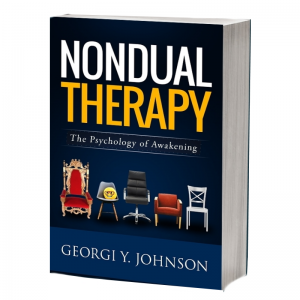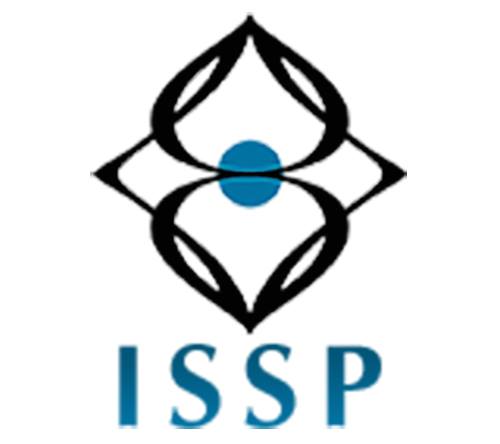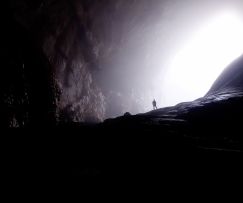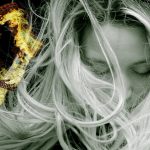*Extracted from the book: Nondual Therapy: The Psychology of Awakening by Georgi Y. Johnson. For a translation of this chapter into Dutch, click here.
The partner of expectation is disappointment.
Curiosity has no opposite.
In curiosity, disappointment and expectation are one.
“The first and simplest emotion which we discover in the human mind, is curiosity.”
EDMUND BURKE
 Curiosity is a natural and spontaneous movement of consciousness. We see it through all forms of life. In a way, it is a celebration of all forms of experience, as well as an inherent ability to penetrate the nature of experience. With curiosity, we penetrate the unknown which propels evolution and transformation beyond the conceptual limitations of the Separate Self.
Curiosity is a natural and spontaneous movement of consciousness. We see it through all forms of life. In a way, it is a celebration of all forms of experience, as well as an inherent ability to penetrate the nature of experience. With curiosity, we penetrate the unknown which propels evolution and transformation beyond the conceptual limitations of the Separate Self.
When we are seated in curiosity, expectation and disappointment dissolve into an experience that is here to be penetrated, studied and released, without definitive conclusion. Disappointment can be painful, but it’s a melody from their depth of need: the unfulfilled need that is intrinsic to disappointment can bring us to deeper layers of ourselves, to places where we have denied ourselves a resource. Expectation can deflect us from the present moment and generate stress and illusion, but what is the fire behind it? What is it that we’re not allowing in ourselves that propels us to grasp towards the future, even to attempt to control the future? Both expectation and disappointment are naturally arising emotions, but where do they begin to dictate our direction, distort our perception and weigh down our sense of well-being? How do they become background states of being?
Curiosity will ask these questions, but won’t dictate the answers. Beyond conclusions and contractions, the seat of curiosity is alive in the here and now, receiving information without filters through the Felt Sense. It will invite trapped experience to life, and as a seat of perception, will open a channel of transformation.
Expectation
 Expectation distorts perception with imagined forms based on memory. Rooted in the impulse to control experience, expectation projects outcomes and actively interferes with direct perception. To live in expectation is to live in a state of vigilance or stress. Stress hormones activate the part of the brain concerned with survival which moves through duality – fundamentally, the duality of good and bad. Born of contractions alive in the present moment, expectation has a subtle way of affirming the same contractions.
Expectation distorts perception with imagined forms based on memory. Rooted in the impulse to control experience, expectation projects outcomes and actively interferes with direct perception. To live in expectation is to live in a state of vigilance or stress. Stress hormones activate the part of the brain concerned with survival which moves through duality – fundamentally, the duality of good and bad. Born of contractions alive in the present moment, expectation has a subtle way of affirming the same contractions.
When we expect the worst, we tend to create the experience of the worst – even before anything ever happened. If we expect the best, we create the experience of the best, which can involve relying quite heavily on denial to upkeep the projection. The eyes of expectation look outward and in this way, it is always disempowered. It is as if the contractions within the personality are dialoguing with the imagination in a manner which precludes surprise or shock. This tendency to live in expectation is generally based on pain and a refusal to experience or process that suffering which is already alive within. In denial of suffering, it restricts the vitality available in the resource of the present moment.
Disappointment
Whatever we expect, we will always be disappointed. When we expect our worst nightmare, and it doesn’t happen, we can experience a secret disappointment – as we will have to wait a little longer for the release of inner form through physical manifestation.
Often our positive expectations are based on bypassing the suffering of the heart into fulfillment, peace, love and freedom. Because these Nondual Qualities are expected to arrive from the outside, in the future, consciousness is blinded a priori to expanding into them in the here and now.
A feeling of disappointment can be the background atmosphere of a lifetime, which perpetually reaffirms itself each time an external object fails to bring satisfaction. It can be especially poignant when that object has previously awoken a sense of connection with our True Nature. Suffering around repeated disappointment can generate a background state of disappointment that constantly fulfills itself. For example, when parents have promised fulfillment to their children to distract them from the difficulty of the present moment – and later broken those promises – then the pattern of broken promises begins to be expected. It makes us feel ‘at home’. Disappointment begins to feel safer than an unexpected fulfillment.
When disappointment becomes an expectation, parts of the psyche that were alert with anticipation start to freeze in depression as consciousness is withdrawn from form. In this way, the stress of expectation solidifies into a freezing of vitality under the verdict that ‘life is disappointing’. The allocation of blame on outer authority further disempowers the psyche, adding to the feeling of impotence in form. Such a client needs a lot of encouragement. They will be reluctant to take time and space. In a way, they have dis-appointed themselves from their lives.
Curiosity: Nondual Quality
 The movement of exploration arising out of curiosity delivers its own reward in the form of impressions through the psyche. Curiosity is a quality that moves beyond the judgmental mind – exemplifying the dialogue, flow and evolution inherent to being here, now.
The movement of exploration arising out of curiosity delivers its own reward in the form of impressions through the psyche. Curiosity is a quality that moves beyond the judgmental mind – exemplifying the dialogue, flow and evolution inherent to being here, now.
Curiosity liberates consciousness and brings authenticity to the sense of connection. As much as it is active through the penetration of form, it is equally receptive in the unconditional allowance of impressions. It has the power to dispel illusion and invite contractions into life, liberating the flow of learning and insight. In this way, curiosity awakens and can open the excitement of increased vitality that comes with the receptive side of the sense of truth.
Above all, curiosity is needed in the nature of expectation and disappointment and the living contractions in the here and now that lead us to displace our direct connection with the layers of who we are.
Contemplations
- When you experience a sense of disappointment or expectation, be curious about the feeling. How does curiosity effect the stress in the body? Is the body also experiencing curiosity?
- Practice silent curiosity as you move about daily activities. Both allow the sense of curiosity towards what you perceive, and notice curiosity in other life-forms. When you’re resting or can close the eyes, be curious about any thoughts, feelings or sensations. It can be simple, like being curious about an area of stress in the body.
Form does not differ from Curiosity
And Curiosity does not differ from Form.
Form is Curiosity and Curiosity is Form.
✽✽✽












